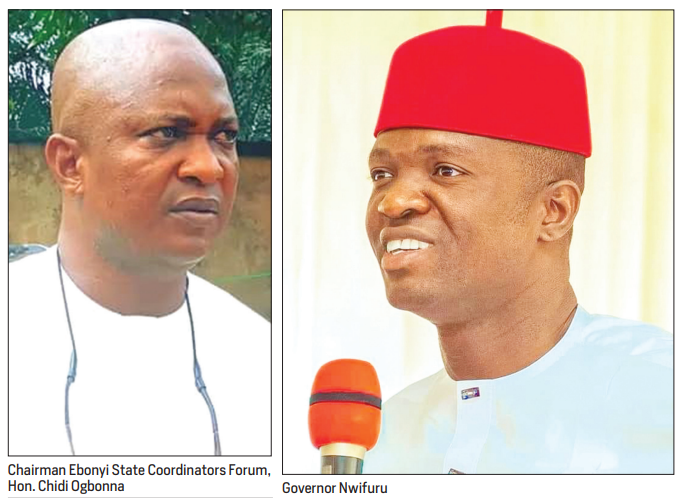[ad_1]

Ebonyi State is one of the five states in the South-East geopolitical zones of the country. It has three senatorial districts and six federal constituencies as well as 13 local government councils and 64 development centres.
On January 15 last year, the current coordinators of development centres were sworn-in by the state Governor Francis Nwifuru.
During the administration of former Governor, Dr Sam Egwu (1999-2007), a total of 24 development centres were created to improve service delivery across the local communities. However, during the administration of former Governor, Martin Elechi, the centres were increased to 64 in number.
Since then successive governments have imbibed the same initiative. Since their creation, these centres have served as a point of administering the local communities by successive governments in their bid to ensure that the dividends of democracy get to the grassroots.
Nwifuru’s charge
Inaugurating the 64 coordinators at the Centenary City, Abakaliki, Nwifuru disclosed that the essence of creating the centres was to bring developments to the grassroots. He said that the state government has complied with the provisions of the law that established the development centres.
Nwifuru charged the coordinators to show capacity and exhibit a high degree of prudence in handling the resources of the centres.
His charge to them: “You should go to development centres and ensure that development gets to the grassroots. “You are to step down the government manifesto as contained in the ‘Peoples’ Charter of Needs’ mantra of this administration.”
Achievements
One year after their inauguration, the coordinators have something to celebrate in their various centres, given the different developments that have taken place within the 12 months they have been in office.
Speaking along this line in a recent interview, the State Chairman of the Coordinators Forum, Chidi Ogbonna, described the last one year as eventful. He said that the year had witnessed grassroots’ transformation with several activities ongoing in the hinterlands.
“We assumed office with a clear cut agenda, several key initiatives have been launched and successfully implemented,” he noted. This is as he disclosed: “Most coordinators of development centres have demonstrated capacity; we believe that grassroots are the key areas that should be taken care of.
“On assumption, we pledged to deliver democratic dividends to the hinterlands by extending good governance to them. Till date, a lot of business activities are going on in the development centres.” While on his part, Chief Anya Baron Ogbonia of Amasiri Development Centre in Afikpo Local Government Area said that the journey so far has been that of success.
According to him: “We the coordinators were able to carry out the governor’s mandate down to the hinterlands, grassroots are the key areas the government should be taken care of.
“Since democracy is about strict adherence to the rule of law, a development centre is a creation of law. In the last one year, there has been a big change in the system; democracy has been stepped down to the grassroots.”
Internal security/community policing
Community policing is an integral component in tackling insecurity in the country. Coordinators of the Development Centres have incorporated community policing as strategy to complement efforts of both federal and state security agencies. Ebonyi State has been adjudged as one of the most peaceful states in the country.
One of the cardinal policies is to maintain peace. Most coordinators on assumption of office consequently formed and equipped vigilante groups and forest guards to ward off criminal elements in the communities.
Coordinators of development centres have worked closely with security agencies to enhance security measures. Under joint projects with the state government, street lights are fixed at strategic locations in most Development Centre’s headquarters to checkmate crimes and facilitate the arrest of vandals.
Agricultural empowerment
This is very fundamental to reducing the scourge of food insecurity facing the nation. Coordinators initiated comprehensive waste management programmes and clean up campaigns, in addition to fostering relationships with various groups, opinion leaders and stakeholders within their centres.
Among the notable achievements within the one year in office are youth empowerment , health care, provision of scholarships, rural feeder roads, rehabilitation of roads, and renovation of schools.
In the last one year, the coordinators have distributed various educational materials to students in schools in their different localities and bursary payments to enhance digital literacy.
Expectations of residents
As the coordinators enter their second year in office, residents of the state have expressed optimism that the coming year would usher in more democratic dividends to the rural communities.
A respondent, who identified himself as Mr Matthew Eworo, urged the coordinators to take the welfare of the rural populace seriously.
“The coordinators must listen to the voice of the people, be prudent in the management of resources,” he charged, noting that the people expect to see more development projects in the coming year.
“We expect more capital projects of high economic value in the years ahead,” he said. Eworo is hoping that the people will witness massive infrastructural development this year courtesy of their various coordinators.
Absenteeism
However, many of the respondents interviewed expressed concern over the incidence of absentee workers at the development centres.
Reacting to the issue, Mrs Elizabeth Okorie, who resides in Ekumeyi Development Centre, emphasised that workers of development centres do not go to work.
“The situation is so pathetic, there should be periodic verification of workers to curb ghost worker syndrome.”
Allocations
John Ogodo, the Coordinator of Ikwo South East Development Centre, said that the centres do not encounter the same peculiarities.
Ogodo stressed that coordinators do not receive equal allocations, noting that more allocations to the centre would engender more dividends to the people.
He explained that even when you have more than one centre in a local government they both do receive the same amount of allocation.
Please follow and like us:
Related
[ad_2]
Source link


